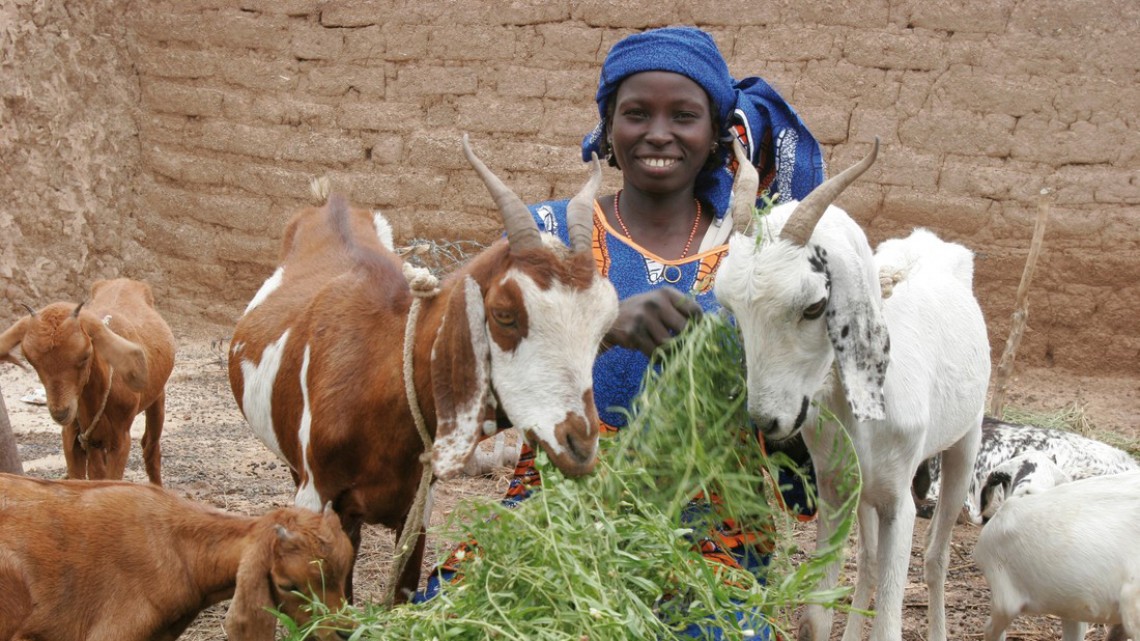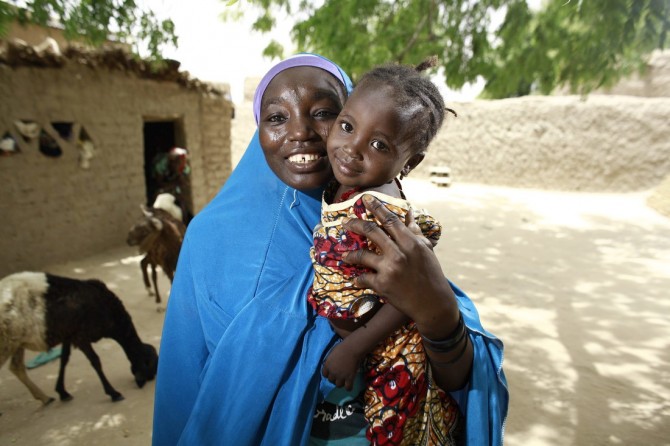
A farmer in Niger feeds her animals.
Cornell-CARE team to advance gender equity, climate resilience in Niger
By Kate Frazer
Cornell University and the international humanitarian agency CARE have been collaborating since 2011 to tackle global problems including hunger, maternal and infant health, and climate change. Thanks to a $200,000 grant from the Innovation for Impact Fund (IIF), which is jointly managed by Cornell’s David R. Atkinson Center for a Sustainable Future and CARE USA, a Cornell-CARE team is embarking on a new project to examine connections between gender equity and climate resilience, and to determine how best to gauge a community’s success in these areas.
Resilience, an increasingly important concept for humanitarian and development organizations, considers not only poverty in the present, but also how poverty changes over time, the impact of extreme weather events, and how communities recover from so-called “climate shocks.”
In West Africa, where most people are engaged in small-scale agriculture, people’s livelihoods are inextricably linked to natural systems and vulnerable to climate phenomena like droughts. A growing body of research shows that progress on gender equity builds the ability of individuals, communities and systems to survive and thrive through such crises. But while the concepts of resilience and women’s empowerment are incorporated into virtually all development programs, there is no clear consensus on the best tools for measuring them.
Enter a team led by Chris Barrett, the Stephen B. and Janice G. Ashley Professor of Applied Economics and Management and dean of academic affairs for the Cornell SC Johnson College of Business, and Mara Russell, CARE’s director for food security and resilience. The Cornell-CARE collaboration aims to create a toolkit for evaluating resilience and women’s empowerment grounded in rigorous research methods and practice.
“Resilience and empowerment are noble, widely shared goals but challenging to operationalize,” said Barrett. “Operationalizing them effectively is crucial if we are to use the limited available resources for development in ways that advance these laudable societal objectives.”
“For CARE, building resilience for vulnerable populations in Niger means increasing peoples’ ability to prepare for, adapt to and recover more effectively from the impacts of climate variability, drought and other shocks,” added Russell. “Cornell’s support via the IIF award will enable us to strengthen our approaches in Niger by measuring causes that are critical, but almost never measured explicitly as part of resilience measurement frameworks, such as gender norms, the socio-cultural context and impacts at the systems level.”
In January, Liz Bageant and Joanna Upton, both researchers at Cornell’s Charles H. Dyson School of Applied Economics and Management, traveled to Niamey, Niger, to work with CARE’s Niger team on possible long-term collaborations that take advantage of the overlap between the institutions’ research goals and programming objectives.
“Our goal is to shed some light on the pros and cons of existing frameworks and strategies for measuring resilience and empowerment, and to assess both their validity and ease of implementation,” Bageant explained.
The team is also actively exploring options for adapting the award-winning index-based livestock insurance in Niger. The model has been used successfully in Kenya and Ethiopia to stave off poverty in times of drought, using satellite imagery to measure the condition of grazing land to more accurately predict livestock losses. But the feasibility of introducing it in a new context depends on a range of factors, including the availability and quality of climate data, institutional capacity to promote and distribute insurance, and socio-economic conditions that determine both insurance demand and its likely benefits.
“Niger is an extraordinarily poor country, fraught with diverse hardships and risks,” said Upton. “During our trip I was reminded of the many challenges this poses for both research and development policy. At the same time, I was heartened by the dedication and determination of local people, from individuals in government institutions to members of pastoral communities. I am hopeful that our partnership with CARE can help to build on and strengthen these local capacities.”
Ultimately, the team believes its findings will help ensure that the scarce resources available to CARE and other organizations are deployed for the greatest impact.
“This project is a prime example of the real-world impact we are aiming for with the Innovation for Impact Fund,” said David Lodge, the Francis J. DiSalvo Director of the Atkinson Center. “The collaboration between Cornell research teams and CARE staff allows us to speed up the delivery of science-based solutions to communities around the world.”
Kate Frazer is a freelance journalist working with the Atkinson Center for a Sustainable Future.
Media Contact
Get Cornell news delivered right to your inbox.
Subscribe

